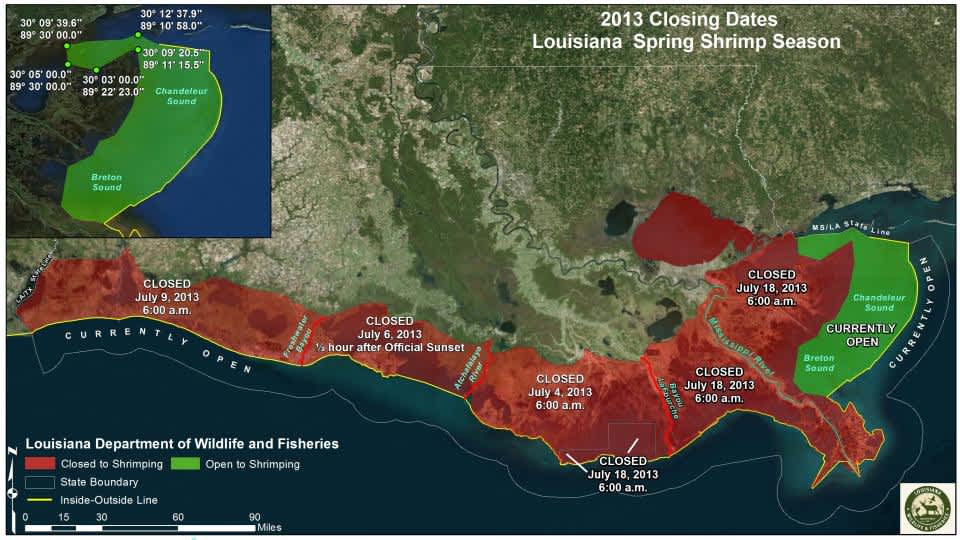Louisiana Shrimp Season to Close in Inside Waters

Today, the Louisiana Department of Wildlife and Fisheries announced the 2013 spring inshore shrimp season will close Thursday, July 18, at 6:00 am in state inside waters in the remaining portions of Timbalier Bay, Terrebonne Bay, Lake Pelto and Pelican Lake where the shrimp season was extended; and, from the Mississippi/Louisiana state line westward to the eastern shore of Bayou Lafourche.
The following state inside water will remain open to shrimping until further notice:
- The portion of Mississippi Sound beginning at a point on the Mississippi/Louisiana Lateral Boundary at 30 degrees 09 minutes 39.6 seconds north latitude and -89 degrees 30 minutes 00.0 seconds west longitude; thence due south to a point at 30 degrees 05 minutes 00.0 seconds north latitude and -89 degrees 30 minutes 00.0 seconds west longitude; thence southeasterly to a point on the western shore of Three-Mile Pass at 30 degrees 03 minutes 00.0 seconds north latitude and -89 degrees 22 minutes 23.0 seconds west longitude; thence northeasterly to a point on Isle Au Pitre at 30 degrees 09 minutes 20.5 seconds north latitude and -89 degrees 11 minutes 15.5 seconds west longitude, which is a point on the double–rig line as described in R.S. 56:495.1(A)2; thence northerly along the double–rig line to a point on the Louisiana-Mississippi Lateral Boundary at 30 degrees 12 minutes 37.9056 seconds north latitude and -89 degrees 10 minutes 57.9725 seconds west longitude; thence westerly along the Mississippi/Louisiana Lateral Boundary to the point of beginning
- The open waters of Breton and Chandeleur Sounds as described in R.S. 56:495.1(A)2
Data collected in recent weeks by LDWF biologists indicate increased quantity, distribution and percentage of small, juvenile white shrimp within these waters. The decision to close this area was made in an effort to protect these developing shrimp and provide opportunity for growth to larger and more marketable sizes.
For a map detailing these closures please visit here.
All remaining state outside waters, as well as those portions of the Pontchartrain Basin described above will remain open to shrimping until further notice, with the exception of those areas still closed to recreational and commercial fishing due to the 2010 Deepwater Horizon oil disaster. Maps of the areas still closed to recreational and commercial fishing are posted to the LDWF website at www.wlf.louisiana.gov/oilspill.
The Department of Wildlife and Fisheries is charged with managing and protecting Louisiana’s abundant natural resources. For more information, visit us at www.wlf.louisiana.gov, on Facebook at www.facebook.com/ldwffb, or follow us on Twitter @LDWF.
For more information, contact Martin Bourgeois at (985) 594-4130 or mbourgeois@wlf.la.gov. For press inquiries, contact Laura Wooderson at lwooderson@wlf.la.gov or (504)430-2623.

